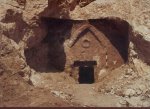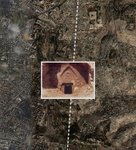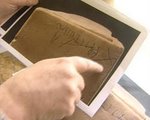Letters: The evidence easily debunks 'Jesus tomb' theory
By THURBER D. PROFFITT, III, PH.D.
The sensationalists are at it again this Easter season, claiming they have found Jesus' tomb "Digging up doubt," Nation& World, Feb. 27]. In 2006, an Italian took a priest to court to prove Jesus never lived. Jesus Seminar theologian John Dominic Crossan says Jesus was not buried. Another believes he survived the crucifixion. Some Muslims contend he is buried in Kashmir.
So what is the truth? For starters, Jesus of Nazareth is a historical person. The pagan Roman historians Tacitus ("Annals," AD 115) and Suetonius ("Lives of the Twelve Caesars," A.D. 125 ) mention him as a real person. So, too, the historian Flavius Josephus refers to Jesus in a contested passage, as does the Talmud, which are Jewish sources. Then there are the gospels, earlier Jewish and Gentile sources.
We have only one biography of Socrates, a late copy at that, but no one questions his historicity, so why question Jesus' historicity or, for that matter, the historicity of the events surrounding Jesus' trial and punishment, for in these cases there are more early attesting sources than for Socrates.
Jesus' trial and punishment were par for the course during the first century. Josephus' account tells of a Jewish prophet who died in the siege of Jerusalem after having been arrested by leading citizens. He was beaten and turned over to a Roman governor, who beat him again in lieu of crucifixion before releasing him, as the Roman Procurator Pontius Pilate had sought to do with Jesus of Nazareth.
Jesus was crucified, killed by suffocation, bleeding, low blood pressure and possibly heat stroke and dehydration. Those who claim he did not die on the cross do not take Roman capital punishment seriously. Only one person is known to have survived crucifixion, one of three friends whom Josephus asked the Romans to release from their crosses. Furthermore, the evidence of a Roman graffito [ancient drawing or writing etched on a wall or other surface]depicts Jesus as a crucified ass. The arguments and evidence suggest that we have no reason to believe Jesus was not dead when he was buried.
J.D. Crossan believes Romans fed crucified criminals to the dogs, hence no burial. Yet the crucified remains of a first-century Jew tell a different tale, and Josephus says that Jewish victims of crucifixion were always buried before sundown.
Some question whether Joseph of Arimathea could request Jesus' body to bury him that quickly. That Josephus could document requests for burial before sundown in the case of crucified Jews suggests Joseph of Arimathea could request Jesus' body also – it depended on whether one had the connections to do so.
Some question if Jesus could be buried in a borrowed tomb. As to this, we have an inscription from Rome by one Sextus Marianus Romulus against unauthorized burials in his family tomb. Thus tombs could be borrowed, with or without permission
Then there is the Nazareth decree/inscription, usually dated to the reign of Claudius (A.D. 41-45), against grave robbing. Why such an inscription in Palestine? Why, indeed, unless the tomb was empty.
Finally there is the expectation in ancient Judaism that the resurrection would occur at the end, not in the middle of history. Why would Second-Temple Jewish men accept women's testimony that Jesus had been resurrected? Why indeed? This belief in Jesus' resurrection set the Jesus messianists apart from other Jewish messianists. This is the real Easter story, that Jesus' bones wouldn't be found in a tomb.
So what of the ossuary [stone boxes for burial of human bones]referred to in the article, "Digging up doubt"? Has the family tomb of Jesus been found? Since 1940, four ossuaries bearing the name Yeshua have been found. Not being a native Jerusalemite, one would expect, in keeping with Second Temple convention, that the name would read Yeshua bar Yosef of Natzaret (or Capernaum, the Galil, or Bethlehem). Furthermore, family tombs were usually in the family's hometown, which was not Jerusalem in the case of Jesus of Nazareth. Only the wealthy or upper middle class could afford rock-hewn tombs, and only in such are ossuaries found. Jesus was not wealthy.
So, yes, Jesus' family tomb has been found, but which Jesus? Certainly not the Jesus associated with Easter.

























No comments:
Post a Comment